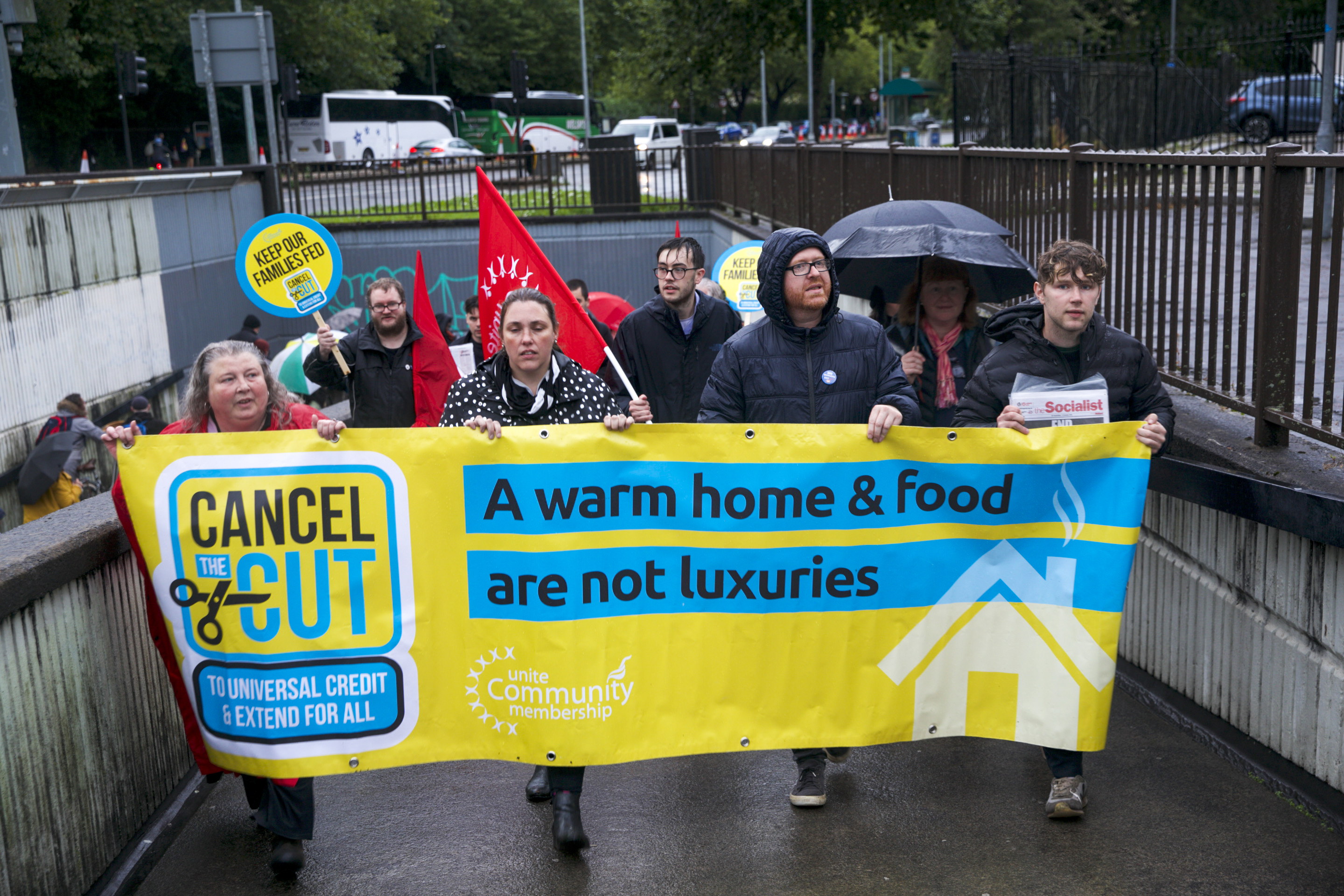
Cost of Living Crisis: Emergency Protest Planned As Energy Prices Soar By £700 A Year
Huge rise in energy bills announced, meaning household heating and electric costs could be £2,000 a year from April.
Meanwhile, global energy firm Shell have announced a quadrupling of annual earnings to $19b as the firm cashed in on high prices.
Protest will assemble at 2.00pm, Saturday 19th February, outside the office of Simon Hart MP, Tory Secretary of State for Wales, near the Betty Campbell Statue, Wood Street, Central Square, Cardiff, and march to British Gas offices
Image: March against poverty in Cardiff, September 2021, by Tom Davies
A protest against the soaring cost of living will take place in Cardiff this month as the price of gas, electricity and food sky-rockets.
Today the energy regulator Ofgem announced a dramatic rise in the energy price cap to £1,971 a year from this April in Wales, Scotland and England. This means that energy companies will be free to charge household’s up to around £2,000 a year for gas and electricity use.
A typical household could face an annual increase of almost £700 on their energy bill as standard tariffs shoot up by 54%. And a further rise of as much as £400 is set to come in the winter, when the cap is lifted again.
The situation has led the anti-poverty group the Joseph Rowntree Foundation to say that the poorest people in society who live alone will end up handing over half of their income (54%) to electricity and gas companies from April, a rise of 21% from what it is now.
Single mothers with children are expected to have to spend a quarter of their total income on energy bills.
The Bevan Foundation has warned that Wales will be hit harder than any part of the UK due to already high levels of poverty and low incomes. In response, the Welsh Government has announced a doubling of the Winter Fuel Scheme, meaning people on the lowest incomes can now claim a £200 grant to help with energy bills, but this will not even cover a third of the expected increase for many.
It’s not bad news for everyone, however. On the same day the energy price cap was lifted, global energy firm Shell announced a quadrupling of annual earnings to $19b, as the firm cashed in on high prices.
Ben van Beurden, chief executive, boasted that 2021 had been a “momentous year” for Shell as profits soared. Meanwhile, Cardiff pensioners in their 70’s are reporting that they have been unable to eat for days due to high energy costs.
Cardiff People’s Assembly, who are organising the protest against the crisis on 19th February, said that during the pandemic, UK Billionaire wealth grew 35% whilst UK Foodbank use grew by 33%.
“Profits have never been higher,” they said in a statement. “And still, they want more.”
“We used to talk about fuel poverty as people forced to choose between heating or eating, but with food prices rising too, it sounds like people will be cold and hungry in one of the richest countries on earth.”
Soaring food prices are also a major factor in the crisis hitting ordinary people and a key reason why the overall rate of RPI inflation is running at 7.1%, a 30 year high.
But the price of basic food is rising much more sharply than inflation figures show, pushing up the cost of the cheapest products the most and affecting those on the lowest incomes.
For example, the Guardian recently reported how a 500g bag of supermarket own-brand pasta, that cost around 55p in late 2020, is now typically 70p, a rise of more than a quarter.
And the food blogger Jack Monroe has also pointed out how the price of the very cheapest products, such as value rice, has gone up by a staggering 344%.
Her highlighting of the way in which official inflation statistics hide the true impact on the very poorest has even prompted the Office for National Statistics to rethink how they report the figures in future.
Both the Bevan Foundation and Wales TUC have said that whilst the Welsh Government must work to address the crisis through schemes such as the Warm Homes programme, it is the UK government that has the most power to address the problem.
“The [UK] Chancellor must come forward with a plan to tackle the cost-of-living crisis,” wrote Wales TUC Secretary Shavanah Taj. “Working people need stronger rights to bargain for fair pay increases. And the £20 boost to Universal Credit needs to be reinstated to support tens of thousands of families in Wales.”
On Wednesday, the UK Tory government announced that after 11 years of their punishing austerity, which has seen financial cuts for the poorest and tax relief for the richest, they now want to ‘level up.’ But the announcement has been torn to shreds by the concession that no new money will be available for the ‘levelling up’ agenda and the fact that the financial situation is only set to worsen for millions of people, often due to their own policies such as the cutting of Universal Credit.
The protest against the cost of living criss on 19th February in Cardiff will come just a week after similar protests are set to be held in cities such as Manchester and London.
Cardiff People’s Assembly, who are organising the protest, said:
“At our protest on Saturday 19th February we would like to bring together everyone affected by the cost-of-living crisis and everyone fighting for a better society…”.
“If we can win an immediate cap on household energy bills, then we will be in a better place to force the government to take electricity and gas off the free market and back into democratic public ownership. If we can win re-nationalisation then we can transform our energy system away from fossil fuels to one that works for people and the planet, not profit.
If we can transform our energy system then maybe we can transform our rigged economy and build a green socialist economy that puts power in the hands of the working class.”
The protest will assemble at 2.00pm. Saturday 19th February, outside the office of Simon Hart MP, Tory Secretary of State for Wales, near the Betty Campbell Statue, Wood Street, Central Square, Cardiff, before marching to the British Gas building.


